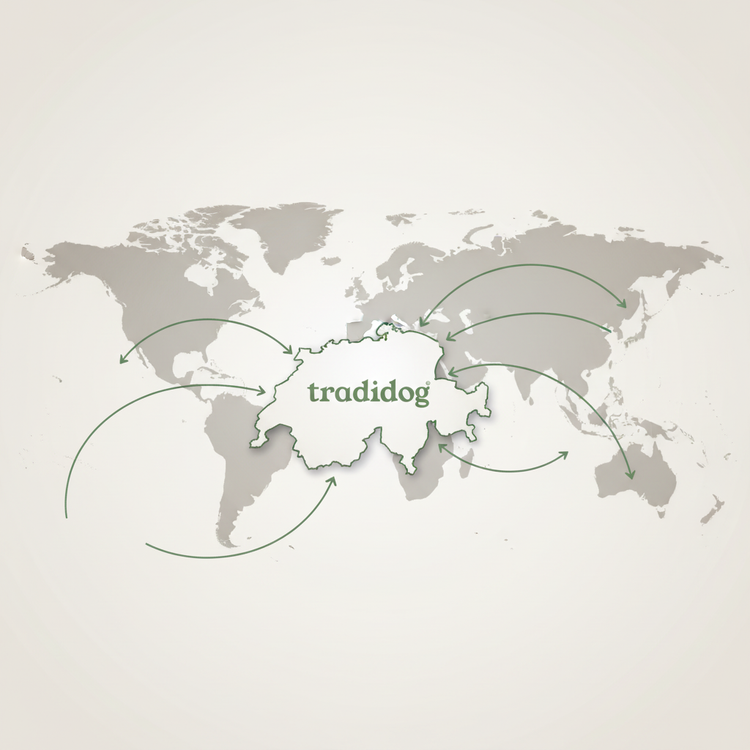
Can dogs eat grapes?
"What's healthy for one person can be toxic for another." This applies not only to humans, but also to our four-legged friends. Perhaps you've ever wondered whether your dog can snack on a few grapes while you're enjoying a bowl of them. The answer is clear: No, dogs are not allowed to eat grapes. In this article, I'll explain why this is the case, what the dangers are, what alternatives there are, and which snacks your dog will enjoy.
So are grapes now taboo for my dog?
First things first: Yes, grapes are taboo for your dog! Grapes and raisins can cause severe, sometimes life-threatening poisoning in dogs. The exact reason for this has not yet been conclusively determined. However, scientists suspect that a specific substance in grapes is responsible for this toxic effect, although this substance has not yet been identified. What is known, however, is that even small amounts can be dangerous for dogs.
The danger depends on the amount of grapes or raisins ingested, as well as the dog's weight and individual sensitivity. For some dogs, just 10 grams of grapes per kilogram of body weight is enough to cause poisoning. With raisins, the effect is even more concentrated, as they contain less water.
The symptoms of grape poisoning can appear quickly, but sometimes only after several hours. Typical signs include:
- Vomiting : Often within a few hours of consumption.
- Diarrhea : Can also occur very quickly.
- Lethargy : Your dog seems weak and apathetic.
- Loss of appetite : Your dog refuses to eat.
- Abdominal pain : This may be manifested by restlessness or whining behavior.
- Kidney failure : In severe cases, acute kidney failure may occur, which is characterized by increased or decreased urination and, in severe cases, complete failure of urine production.
If left untreated, such poisoning can be fatal. If you suspect your dog has eaten grapes or raisins, don't hesitate: Contact your veterinarian or animal hospital immediately. The sooner action is taken, the better the chances that your dog will escape without lasting damage.
Are there any exceptions?
You may have heard stories from dog owners whose dogs ate grapes without showing symptoms. However, this doesn't mean these dogs are "immune." Every dog reacts differently to toxic substances. Some dogs can digest small amounts of grapes without visible consequences, while others become seriously ill even with the smallest amount. There is no safe amount, and therefore it's better not to take any risks.
Healthy alternatives for your dog
Fortunately, there are many healthy and delicious snacks that you can safely offer your dog. Here are some suggestions:
Types of fruit that dogs can tolerate:
- Carrots: Crunchy, low in calories and rich in beta-carotene – perfect for chewing and snacking.
- Apples: Be sure to remove the core and seeds, as they contain toxic hydrogen cyanide.
- Bananas: A sweet treat rich in potassium. Make sure your dog only gives them in moderation, as they contain a lot of sugar.
- Blueberries: Full of antioxidants and a great little snack between meals.
- Cucumbers: Low in calories and refreshing, especially popular in summer.
- Strawberries: Sweet and full of vitamins, but as with all fruits, only in moderation.
Vegetables suitable as a snack:
- Sweet potatoes: Gently cooked and served in small pieces.
- Broccoli: Very nutritious in small quantities and lightly steamed.
- Zucchini: A neutral, easily digestible snack.
Of course, it's not just the alternatives that are interesting, but also potentially other dangerous foods. We've already written several blog posts on this topic. We'll link to three of them here:
What about ready-made dog snacks?
In addition to fruits and vegetables, you can also choose snacks made specifically for dogs. However, make sure they don't contain added sugar, spices, or preservatives. It's worth checking the ingredients list and choosing products with natural ingredients.
Practical tip: How do you avoid dangers for your dog in everyday life?
- Store grapes safely : Make sure grapes and raisins are stored out of reach of your dog, such as in locked drawers or on high shelves.
- Inform all family members : Children and visitors should know that grapes and raisins are taboo for dogs.
- Alert behavior : Watch your dog and keep him away from tables or food scraps to avoid accidents.
Conclusion
Dogs and grapes – this is a combination you should definitely avoid. While it may be tempting to give your dog a small piece, even a small amount can pose health risks. With alternatives like carrots, apples, or blueberries, you can offer your four-legged friend healthy and tasty snacks that will enjoy and benefit them. Always remember: better safe than sorry. If your dog does eat grapes or raisins, don't hesitate to contact a veterinarian immediately. With proper attention and healthy alternatives, your dog will stay happy and healthy.
Tradidog motto: Even if you can't believe it: Keep your hands off grapes!
Share

